July

It is important to educate people about disease preventive measures
The Vice President of India, Shri M. Venkaiah Naidu has called for medical universities to introduce teachings in human values as a part of the curriculum to inculcate moral, social and ethical values in students. He was delivering the 3rd Convocation Address of Mahatma Gandhi University of Medical Sciences & Technology, in Jaipur, Rajasthan.
Shri Naidu appreciated the rather young University for having blossomed into an important center for providing quality medical education and healthcare in a short span of time. He complimented Dr. M.L. Swarankar and his team for their commitment and dedication towards making the institution one of the foremost centers of excellence in terms of quality teaching, training, research, innovation and affordable patient care in India.
Stating that education laid the foundation for the progress of a nation, the Vice President said that the right kind of education would inculcate citizenship values, liberate people from ignorance, empower them with knowledge, information, skills and equip them to take up new roles and responsibilities to shape not only their own destinies but also the destiny of the nation.
The Vice President opined that educational institutions for higher learning have to develop a system to impart relevant and right type of education integrated with skills. ‘India’s educational ethos needs major reforms in the context of changes that are sweeping the country and the world’ he added.
Urging universities to deliver a more comprehensive medical education, which develops the total personality of the young medical graduates, Shri Naidu called for the inclusion of subjects like medical ethics, human behavior sciences, philosophy, culture, heritage, meditation and Yoga in the curriculum.
Imploring the students to ‘Never give up’, the Vice President said that neither success nor failure is permanent. ‘Believe that perseverance, hard work and unshakable determination – shall always triumph’, he emphasized.
Shri Naidu highlighted India’s achievements in providing basic and advanced health care since Independence and raised caution against the twin burdens of communicable and non-communicable diseases that India is bearing today.
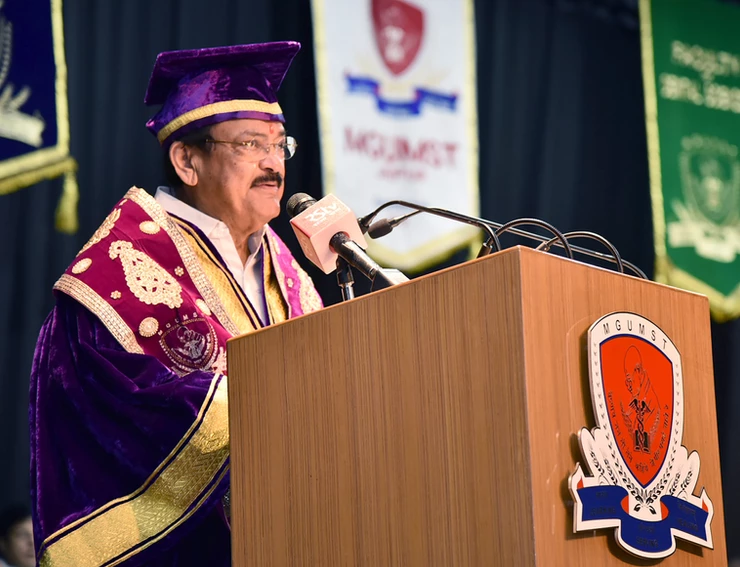
Speaking of lopsided infrastructure development in the health sector., the Vice President called for the provision state-of-the-art healthcare facilities in the rural and remote areas on par with the modern hospitals in urban areas.
Shri Naidu urged the private sector needs to supplement the efforts of the government, especially in bridging the urban-rural divide. He also suggested to make it mandatory for MBBS graduates to serve in rural areas before granting the first promotion to them in a bid to overcome shortage of doctors in rural areas.
Observing that in India Doctors are considered next to God, the Vice President said that it was the cardinal responsibility of all those entering the medical profession to uphold the trust and confidence of the patients who seek treatment from them. The Vice President reminded the students that they were members of a noble profession and asked them to always remain committed to upholding the Hippocratic Oath. ‘Maintain the highest standards of ethics and integrity at every stage’, he told the graduating students.
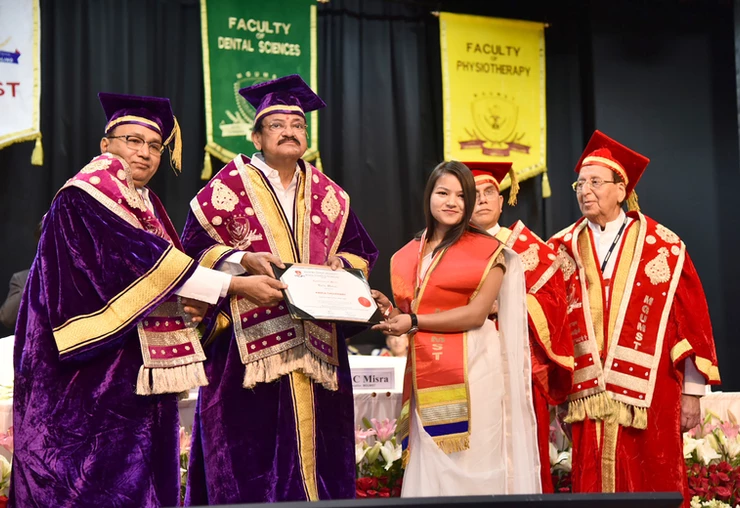
Speaking of the affordability of medical care, Shri Naidu said that medical costs were mostly met out-of-pocket by the people in India. He expressed deep concern over the debt trap into which impoverished patients got into due to medical treatments. He expressed happiness upon the launch of Ayushman Bharat – National Health Protection scheme to provide universal health care to 500 million poor and vulnerable people.
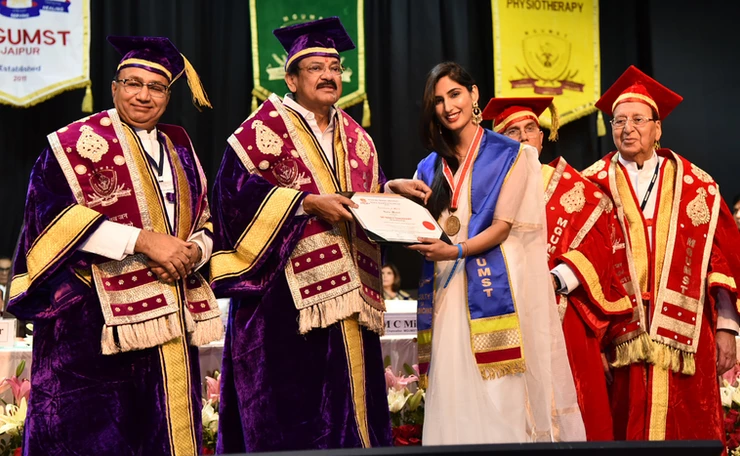
Following is the text of Vice President’s address:
” I am delighted to be ‘Chief Guest’ and deliver the 3rd Convocation Address of Mahatma Gandhi University of Medical Sciences & Technology at Jaipur.
I thank Dr. M.L. Swarankar, an IVF specialist and the Chairperson and Chancellor of this University for inviting me to share my thoughts with the students, faculty and others associated with this university.
I am told that Mahatma Gandhi University of Medical Sciences & Technology – rather a young and self-financing State University was created by an act of Rajasthan Legislature in the year 2011. In a short span, it has blossomed into an important center for providing quality medical education and healthcare.
I am told that this institution is offering graduate and postgraduate programmes of medicine, super-specialties, Dental Sciences, Nursing, Physiotherapy, Occupational therapy, M.Sc, B.Sc, Ph.D in medical subjects and diploma / certificates in Paramedical Sciences. With an attached medical college hospital having more than 1500 beds, I am told that it has so far successfully done more than 650 kidney transplants, 14 liver transplants, two heart transplants, one pancreas transplant and a lung transplant in a span of five years. I am told that a modern Cancer therapy Centre and super-specialties of Neurosurgery, Cardiac Surgery, Uro-surgery and Transplant Surgery have been recently added.
I must compliment Dr. M.L. Swarankar and his team for their commitment and dedication and working in the direction of making this institution one of the foremost centers of excellence in terms of quality teaching, training, research, innovation and affordable patient care in India.
My dear young friends! Convocation, besides being a ceremony to rejoice and receive degrees, is also an occasion to introspect and chalk out your future goals.
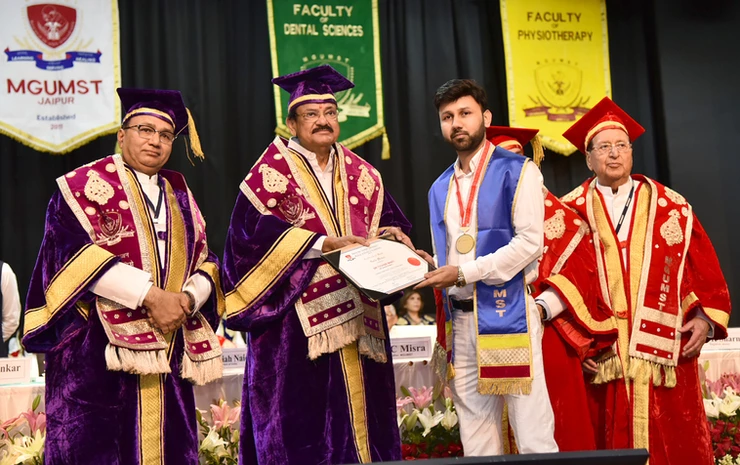
Education lays the foundation for the progress of a nation. Through right kind of education, we can inculcate citizenship values, liberate people from ignorance, empower them with knowledge, information, skills and equip the youngsters to take up new roles and responsibilities to shape not only their own destinies but also the destiny of the nation.
Educational institutions for higher learning have to develop a system to impart relevant and right type of education integrated with skills. India’s educational ethos needs major reforms in the context of changes that are sweeping the country and the world.
It is high time that the teachings in human values be also introduced in the medical education. The need has arisen in view of the degeneration in moral, social and ethical values. We must also seriously think of delivering a more comprehensive medical education, which develops the total personality of the young medical graduates. Subjects like medical ethics, human behavior sciences, philosophy, culture, heritage, meditation and Yoga must become part of the course.
I congratulate the students who have received their degrees, medals and academic prizes. Today, you are standing on a bridge between the past and the future. Education is a life-long process of learning, while graduation is but a milestone in your journey as you begin a new chapter of your life.
Remember that you are the architect of your future. Hard work always pays. There is no substitute for hard work. Greater the hard work, greater the dividends of success. It is important to dream high and set goals. Equally important is to work hard to achieve your goals.
My dear graduates, you might face setbacks at times. But that should not upset you as neither success nor failure is permanent. Obstacles and difficulties are part of the journey to success. Believe that perseverance, hard work and unshakable determination – shall always triumph. Never give up. As all of you are aware, we came a long way in providing basic and advanced health care since Independence. We are able to improve life expectancy, reduce maternal and infant mortality rates and improve quality of life in general. However, we are facing the twin burdens of communicable and non-communicable diseases. Although polio, tetanus and small pox were successfully eliminated, diseases like TB, malaria, chikangunya and dengue are still prevalent. Also lot more efforts are needed to further bring down IMR and MMR indices across the country.
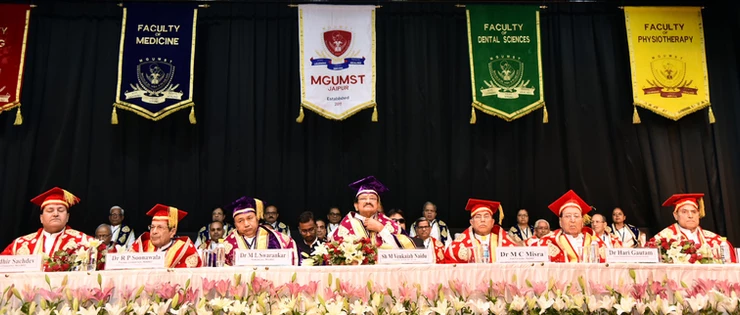
An area of concern that needs to be addressed is the lopsided infrastructure development in the health sector. Although PHCs, Taluk hospitals, and District hospitals are catering to the health requirements of the rural people, much more needs to be done to provide state-of-the-art healthcare facilities in the rural and remote areas on par with the modern hospitals in urban areas. The private sector needs to supplement the efforts of the government, especially in bridging the urban-rural divide.
One of the ways to overcome shortage of doctors, particularly in rural areas is to make it mandatory for MBBS graduates to serve in rural areas before granting the first promotion to them.
Dear students, you must remember that not many have had the benefit of such privileged education like yours. You therefore have a greater responsibility in building a healthy India.
Doctors are considered next to God in our country and it is the cardinal responsibility of all those entering the medical profession to uphold the trust and confidence of the patients, who seek treatment from them. Remember that you are a member of a noble profession and always remain committed to upholding the Hippocratic Oath. Maintain the highest standards of ethics and integrity at every stage.
As regards affordability of medical care, medical costs are mostly met by out-of-pocket expenses by the people. For many poor and middle class families, hospitalization means disposing of family silver and getting into debt trap.
I am happy that the government has launched Ayushman Bharat – National Health Protection scheme to provide universal health care to 500 million poor and vulnerable people.
My best wishes to the students, teachers and the administrators of the Institution for all your future endeavours.
JAI HIND!”


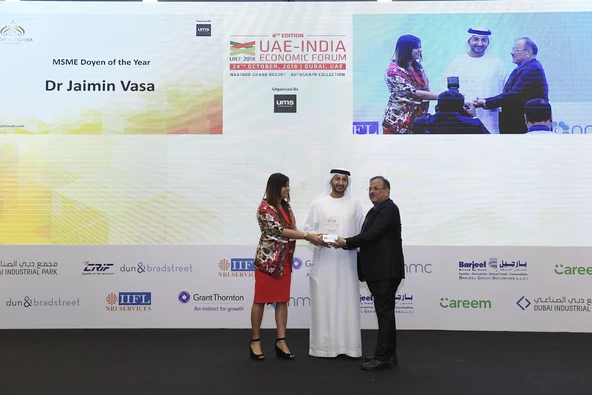
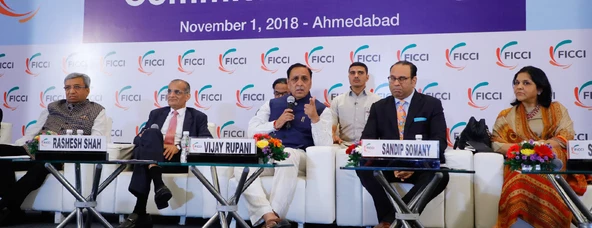
Leave a Reply